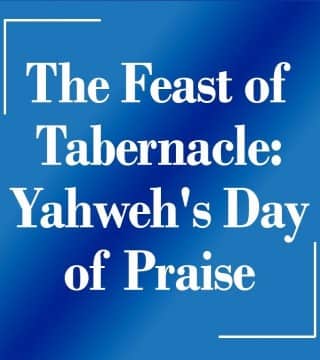Rabbi Schneider - Understanding Tabernacles (06/19/2023)
Today we're going to be talking about the last of the Lord's fall holy days. This is the seventh holy day of the Lord as described in the book of Leviticus chapter 23. Once again it's the final of the holy days, and I love the fact that there are seven of these days in addition to shabbat, because seven is a number that represents perfection. We read in the Book of Revelation, for example, that there are seven spirits before the throne of the Lord.
Now as we come to this special season of Sukkot, as we call it in Hebrew, the Feast of Tabernacles, this is the climax of all the fall holy days. In the fall we started out celebrating the feast of trumpets or Rosh Hashanah, in preparation for Yom Kippur, the most holy and sacred day of the year. And now that we've been through Rosh Hashanah that led us into the season of repentance, and move through this sacred solemn day of Yom Kippur, it's time to celebrate.
So the Feast of Tabernacles is the time of celebration. We read in ancient rabbinical sources that rabbis would do somerSaults, praising God and standing on their head, shouting "Hallelujah". This is such a joyous time of the year, because it represents God's beauty and bounty, and it's a call for us to be grateful for all that Hashem, all that Father God has done for us.
Did you realize that it's actually a sin not to be joyful? I know it's hard to be joyful sometimes, life is hard. I experience it just like you do. But we should remind ourselves that God deserves to be praised, and he deserves for us to be happy as best we can, because of who he is, and all that he does for us. The good news is that even when life is hard, God's doing something, so he's using it all for good.
Now the feast of Sukkot is one of the Pilgrim feasts. During the season of the year, the Feast of Tabernacles, Jews from all over come to Jerusalem to worship the Lord, to present a special offering to him, to give him back for all the good that he has done for them. So, I would encourage you and I today to remember that God at the end of the day is doing a great thing in your life. And even in the world right now, as difficult as the world is, because God has a plan. God is victorious, and God is calling us to rejoice in him continuously. It's the season of rejoicing.
And as I shared at many times in the past, I want to share again here today with you: rejoicing is not first about feeling something, rejoicing is making a decision of your will and with your will to thank God, to be happy to count your blessings, and to say, "Father, Baruch Hashem, I love you. Thank you for who you are, and all you've done for me". Because the truth is, beloved, let's face it, we don't deserve anything. We don't even deserve to be here. We're only here for one reason: God decided to create us. So, let's use the life that we have to bless him, and thank him. And as we do, as we rejoice continually, which is the message of the feast of Sukkot, and the Feast of Tabernacles, we're going to ascend every tribulation.
And if you're going through a trial right now, remember that the Feast of Tabernacles reminds us of how the children of Israel live in temporary tabernacles, temporary boos, when they journeyed for 40 years in the wilderness wandering on the way out of Egypt into Israel. And even when they were in that trial, that temptation, that a difficult period in the wilderness, God was with them, he took care of them, and he blessed them, and eventually brought them in to their inheritance. And he's going to do the same for you. God bless you. This is rabbi schneider saying to you: I love you and shalom.

